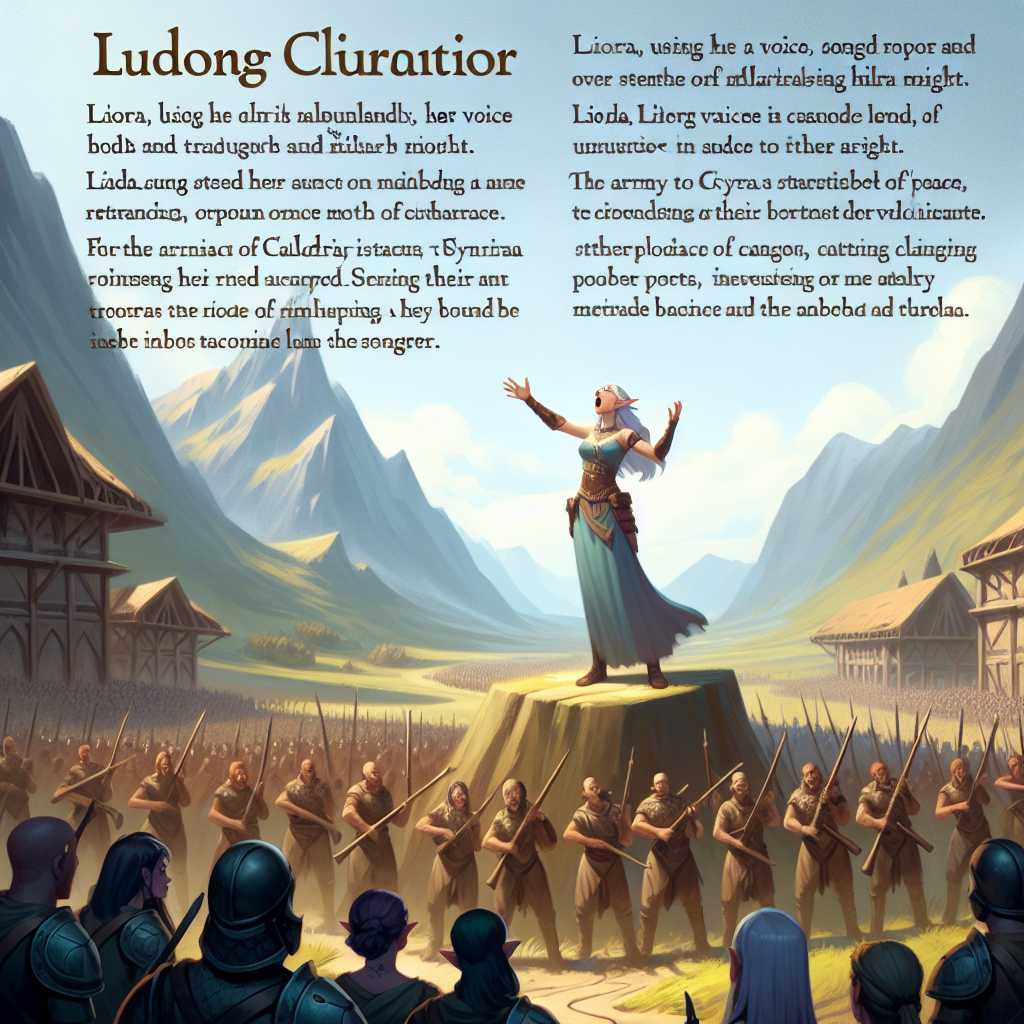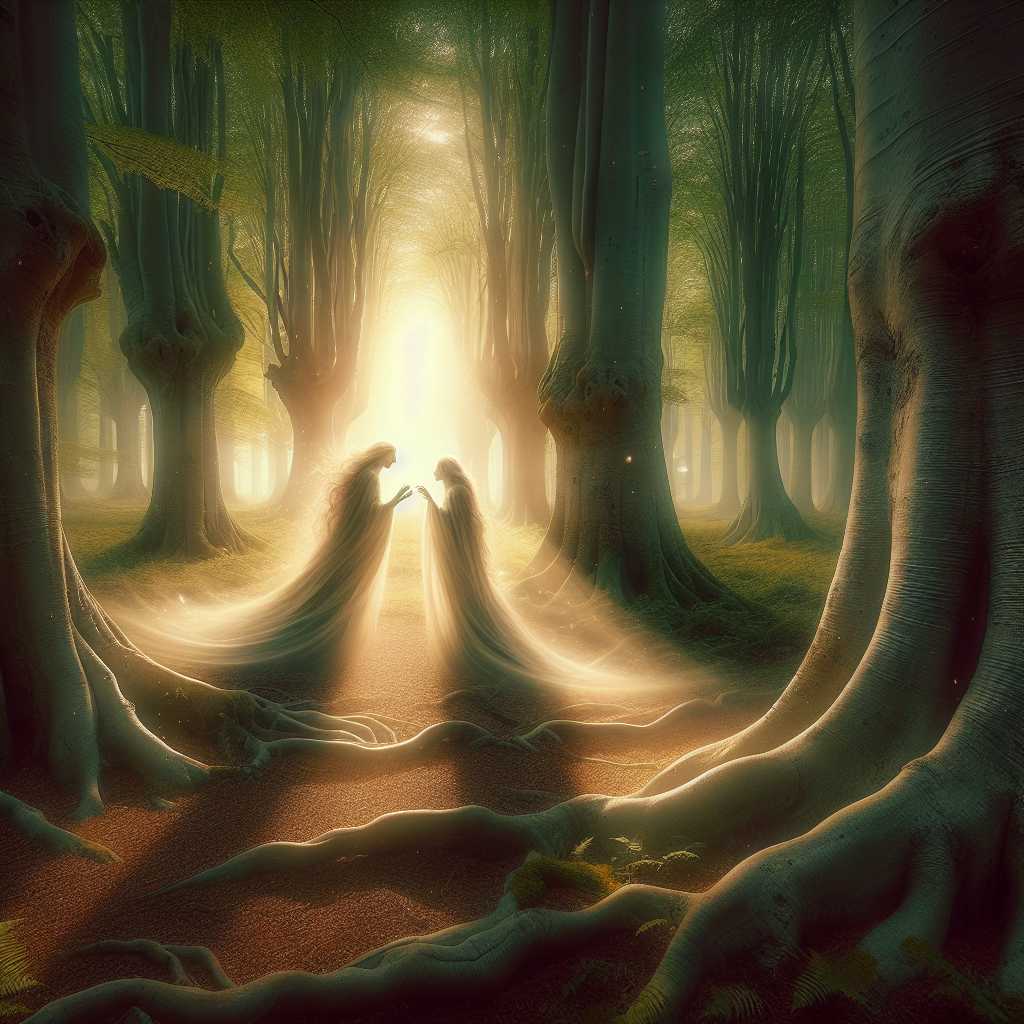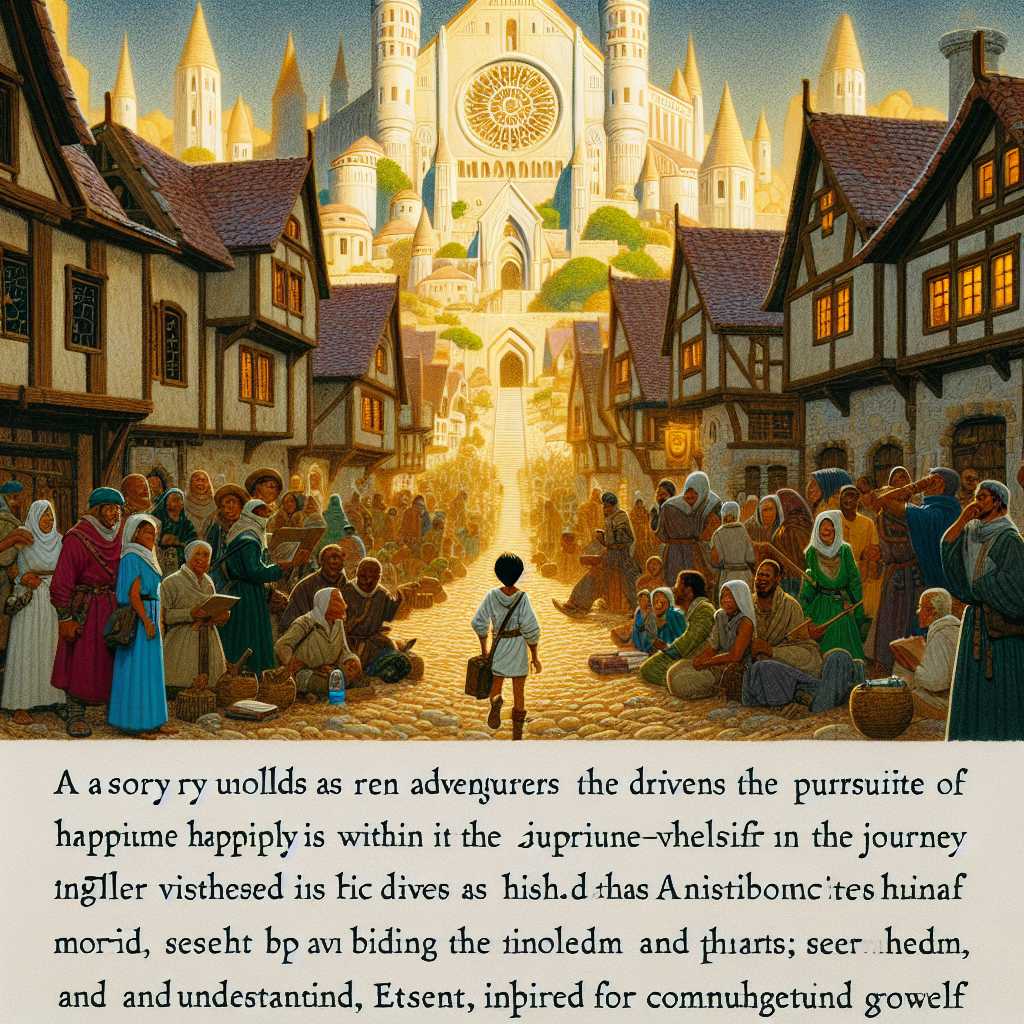
Once upon a time, in an age long forgotten, when the lands of Caldria were still swathed in the melodies of harps and the whispers of wizards, there lived a young maiden named Liora. Her eyes sparkled like the morning dew, and her voice resonated like the chorus of a thousand nightingales. Liora, daughter of a humble villager, seemed to hold within her the very essence of Caldria's enchanting music.
The heart of Caldria was its vibrant marketplace, a crossroad of cultures and ambitions, where merchants traded silks, spices, and stories. Amid the din of bartering voices and the aroma of exotic goods, Liora's haunting lullabies were both a balm and an invitation. Her music, as timeless as the stars, was said to have been blessed by the Elders themselves, for it soothed weary travelers and delighted the curious souls who gathered to listen.
**Elandor**, a land to the north, was ruled by a king whose desire for power eclipsed all else. King Cynrek, as he was known, was a man obsessed with mysteries and lore. Tales of Liora's voice reached his ears through the web of travelers and traders. He became consumed by the thought of acquiring such a treasure for his court, believing that her voice held the secret to the ancient songs of power.
King Cynrek dispatched his most trusted emissary, Lord Brythar, to fetch Liora. Brythar, a man whose heart harbored shadowy motives masked by a facade of duty, rode to the village of Caldria with a small retinue. He approached Liora with honeyed words and promises of wealth and standing, yet she only heard the discord of a world she had no desire to enter.
"My dear Liora," Brythar spoke with feigned warmth, "King Cynrek offers you a place of honor in his court. Your voice is a gift that must be shared with the world."
Liora, ever graceful in her refusal, replied, "The world needs not my voice, but the echo of its own heart. I am but a vessel of nature's song, and here in Caldria, I remain true to the harmony I cherish."
Enraged by her defiance, Brythar resorted to threats. Yet Liora stood firm, her courage as unwavering as the winds that carried her songs. Caldria's people, seeing the light of defiance in her eyes, rallied around her, refusing to allow their cherished muse to be ripped away by the machinations of a distant king.
In secret council, the villagers devised a plan. They believed that deeper within the woods, where the old magic still slumbered, Liora might find sanctuary. As dusk painted the village in hues of deep purple, Liora was whisked away by a trusted few. Together, they journeyed through the twisting paths, guided by the faint luminescence of the fireflies that danced in the night.
As they approached the heart of the forest, an ancient oak stood sentinel—a tree so vast and venerable that even time bowed to its majesty. Legend spoke of this tree as the guardian of the woods, bound by spells to those who sang the songs of old with genuine spirit. Liora stepped forward. Her voice, gentle yet powerful, wove itself through the air, a tapestry of pure emotion.
**It was in this moment that the forest came alive.** Leaves shimmered and danced, and a soft luminescence bathed the surroundings. Liora's song was one of hope and belonging, a reminder of the harmonious balance all creatures shared. Birds joined her chorus; the wind became her accompaniment.
In Elandor, King Cynrek was not to be trifled with. Angered by Brythar's failure, he declared his intention to march upon Caldria and claim Liora by force. An army was assembled—horsemen, archers, and men with faces set in determination, all driven by the king's insatiable greed.
The morning of battle arrived. Caldria stood silent, bracing for the storm that loomed on the horizon. While the villagers made ready to defend their home with crude weapons and courage born of desperation, Liora remained cloaked in the heart of the forest, watched over by the ancient oak.
As Cynrek's armies advanced, a mist curled from the grove, thick and impenetrable. A song, barely audible at first, began to rise—a lament and a warning. It was Liora, her voice now intertwined with the very essence of the land. Her song grew louder, resonating through the trees and across the battlefield.
The advancing soldiers found themselves ensnared in the mist, struck by visions of what might have been and the cost of greed. Some spoke of fields of flowers wilting to desert, of crystal waters turning to ash. Overwhelmed by the weight of these dreams, the soldiers hesitated, and their resolve faltered.
Victory belonged not to swords or arrows that day, but to the purity of a single voice that sung for peace and understanding. Caldria was spared its fate, its people untouched by the wrath of war. In Elandor, tales spread of Cynrek's shame, a king bested not by might but by the enduring strength of song and the spirit of a land.
Even as the years drifted by and Caldria evolved, the legacy of Liora was never forgotten. From town to town, her story was told and her songs passed down. Travelers spoke of a young woman whose music held the power to reshape hearts, sowing seeds of harmony where discord attempted to reign.
And so, in the annals of history, in the voices of countless singers who followed in her footsteps, the last song of Liora lingered on, a gentle reminder of the power of unity and the enduring gift of nature's symphony.










